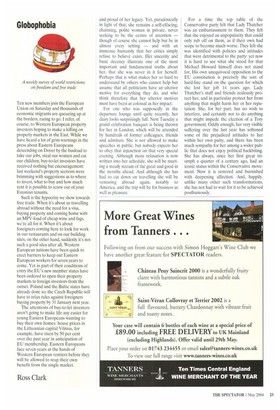Globophobia
Ten new members join the European Union on Saturday and thousands of economic migrants are queueing up at the borders, raring to go. I refer, of course, to Western European property investors hoping to make a killing on property markets in the East. While we have heard a lot of grim warnings in the press about Eastern Europeans descending on Dover by the busload to take our jobs, steal our women and eat our children, buy-to-let investors have received nothing but encouragement: last weekend's property sections were brimming with suggestions as to where to invest, what to buy and how much rent it is possible to screw out of your Estonian tenants.
Such is the hypocrisy we show towards free trade. When it's about us travelling abroad without the need for a visa, buying property and coming home with an MPV-load of cheap wine and fags, we're all for it. When it's about foreigners coming here to look for work in our restaurants and on our building sites, on the other hand, suddenly it's not such a good idea after all. Western European nations have been quick to erect barriers to keep out Eastern European workers for seven years to come. Yet as part of their conditions of entry the EU's new member states have been ordered to open their property markets to foreign investors from the outset. Poland and the Baltic states have already done so; the Czech Republic will have to relax rules against foreigners buying property by 31 January next year.
The attentions of buy-to-let investors aren't going to make life any easier for young Eastern Europeans wanting to buy their own homes: house prices in the Lithuanian capital Vilnius, for example, have risen by 50 per cent over the past year in anticipation of EU membership. Eastern Europeans face seven years at the hands of Western European renders before they will be allowed to reap their own benefit from the single market. and proud of her legacy. Yet, paradoxically in light of that, she remains a self-effacing, charming, polite woman in private, never seeking to be the centre of attention — though of course she cannot help but be in almost every setting — and with an immense humanity that her critics simply refuse to believe exists. Her sincerity and basic decency illustrate one of the most important and fundamental truths about her, that she was never in it for herself. Perhaps that is what makes her so hard to understand by others who cannot help but assume that all politicians have an ulterior motive for everything they do, and who think therefore that her ulterior motives must have been as colossal as her impact.
For one who was supposedly in the departure lounge until quite recently, her diary looks surprisingly full. Next Tuesday a grand celebration banquet is being thrown for her in London, which will be attended by hundreds of former colleagues, friends and admirers. She is not allowed to make speeches in public, but nobody expects her to obey that injunction on that very special evening. Although more relaxation is now written into her schedule, she will be meeting a steady stream of the great and good in the months ahead. And although she has had to cut down on travelling she will be venturing abroad again, notably to America, and the trip will be for business as well as pleasure. For a time the top table of the Conservative party felt that Lady Thatcher was an embarrassment to them. They felt that she enjoyed an unpopularity that could only rub off on them, as if their own had scope to become much worse. They felt she was identified with policies and attitudes that were detrimental to the party: yet now it is hard to see what she stood for that Michael Howard himself does not stand for. His own unequivocal opposition to the EU constitution is precisely the sort of hard-line stand on the question for which she lost her job 14 years ago. Lady Thatcher's staff and friends zealously protect her, and in particular protect her from anything that might harm her or her reputation. She, for her part, has no wish to interfere, and certainly not to do anything that might impede the election of a Tory government. Oddly enough, her very visible suffering over the last year has softened some of the prejudiced attitudes to her within her own party, and there has been much sympathy for her among a wider public that does not enjoy political backbiting. She has always, since her first great triumph a quarter of a century ago, had an iconic status within the Conservative movement. Now it is restored and burnished with deepening affection. And, happily, unlike many other such transformations, she has not had to wait for it to be achieved posthumously.


































































 Previous page
Previous page